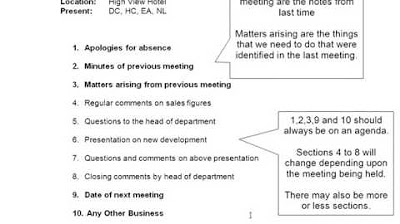How to Write Meeting Minutes EXPLAINED
Summary
TLDRThis video explains the importance of keeping meeting minutes for organizations. It highlights that minutes help track what's happening within the organization and ensure compliance with legal duties. Responsibility for taking minutes typically falls on a clerk or secretary, but ultimately it’s the organization’s duty. The video also discusses best practices for taking and organizing minutes, emphasizing that they should mirror the meeting agenda and capture important decisions and votes without overly detailed transcripts. It cautions against including confidential information and provides guidance on balancing detail in minutes.
Takeaways
- 📋 Meeting minutes are essential for tracking events, allowing members to catch up and ensuring legal duties are met.
- 📝 The responsibility of taking minutes usually falls on a clerk or secretary, but ultimately it's the organization's responsibility.
- 👥 If the designated minute-taker is unavailable, an alternate should be named to ensure minutes are still recorded.
- 📅 Minutes should follow the structure of the meeting agenda, including sections like attendance, old business, and new business.
- 🗣️ It's important to record the names and stances of any non-members who address the board during meetings.
- 🗳️ Every board member's vote on each issue, whether procedural or substantive, should be recorded.
- 🎥 Taping or live-streaming meetings can reduce the need for extremely detailed minutes.
- ⏳ Minutes should provide an overview rather than a word-for-word record, for the benefit of those who missed the meeting.
- 🔒 Confidential information should not be included in the meeting minutes to protect the organization.
- ⚖️ Minutes can be accessed by authorities during investigations, so they should be honest but mindful of sensitive details.
Q & A
Why is keeping meeting minutes important for an organization?
-Meeting minutes provide a resource for members of an organization to keep track of what's occurring, catch up on missed meetings, and ensure that the organization meets its legal duties, particularly for outside regulators and auditors.
Who is typically responsible for taking meeting minutes in an organization?
-A clerk or secretary is usually responsible for taking meeting minutes, as it is part of their job description to attend meetings, take notes, and manage the minutes for future use.
What happens if the designated clerk or secretary is unavailable for a meeting?
-The organization should have a system in place to assign an alternate person to take meeting minutes in case the designated clerk or secretary is unavailable.
What sections should the meeting minutes generally include?
-Meeting minutes should mirror the agenda of the meeting and typically include sections like attendance, old business, new business, and, if applicable, any statements or stances from non-members addressing the board.
How should votes be recorded in meeting minutes?
-The vote of every board member on each issue, whether procedural or substantive, should be noted in the minutes.
Is it necessary to record every word spoken in a meeting?
-No, it is not necessary to record every word. The person taking minutes does not need to be a stenographer, as the focus should be on capturing key points and decisions.
Why should the person taking minutes avoid including confidential information?
-Confidential information should be excluded from minutes because, in the event of an investigation, the minutes can be accessed by authorities, and including sensitive data could be problematic.
What balance should be struck when detailing minutes?
-There should be a balance between providing sufficient detail to give a clear overview of the meeting and avoiding excessive detail, as lengthy minutes might be unhelpful for someone looking for a quick summary.
Why might organizations tape or live-stream their board meetings?
-Taping or live-streaming meetings reduces the need for detailed written minutes, as the recordings serve as a full record of the discussion and can be reviewed later if necessary.
How should minute takers handle negative information that reflects poorly on the organization?
-Minute takers should be careful and thoughtful in handling information that reflects poorly on the organization, though they should always remain honest and accurate in their documentation.
Outlines

Esta sección está disponible solo para usuarios con suscripción. Por favor, mejora tu plan para acceder a esta parte.
Mejorar ahoraMindmap

Esta sección está disponible solo para usuarios con suscripción. Por favor, mejora tu plan para acceder a esta parte.
Mejorar ahoraKeywords

Esta sección está disponible solo para usuarios con suscripción. Por favor, mejora tu plan para acceder a esta parte.
Mejorar ahoraHighlights

Esta sección está disponible solo para usuarios con suscripción. Por favor, mejora tu plan para acceder a esta parte.
Mejorar ahoraTranscripts

Esta sección está disponible solo para usuarios con suscripción. Por favor, mejora tu plan para acceder a esta parte.
Mejorar ahora5.0 / 5 (0 votes)






